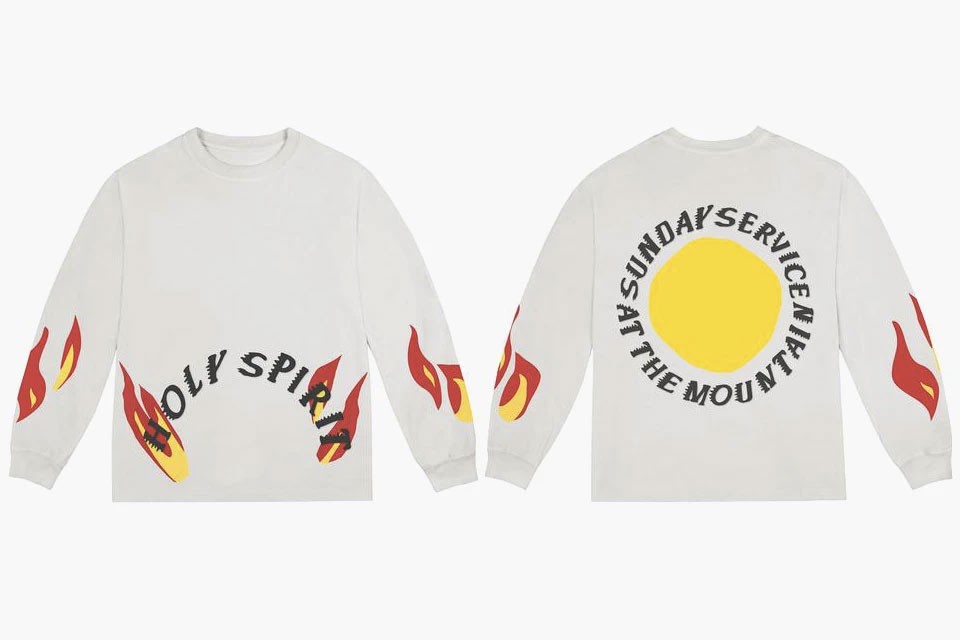“Kanye West’s Sunday Service Merch Puts Fonts on the Main Stage,” menswear site Highsnobiety declared on the heels of ravenous demand for the rapper’s new church-centric wares. Released in connection with West’s Coachella performance this spring and thereafter on his e-commerce site, the “Trust God,” “Holy Spirit,” and “Jesus Walks”-scribbled wares have reportedly since been pulled from the web following criticism about the rapper-slash-designer using religion-inspired products for profit.
Faith-based qualms aside, the emphasis by at least some media outlets on the fonts that appear on the controversial $225 sweatshirts and $70 tees is interesting, in large part because lookalike wares will inevitably soon find their way to the web, whether it be by way of Fashion Nova, Missguided, Forever 21, or any of the other retailers that routinely look to West for inspiration. The near-inevitability that West’s “church merch” will be replicated widely and maybe exactly, fonts and all, sheds light on a commonly-raised question: are fonts protectable by law?
Chances are, when the aforementioned merch is copied and offered up by fast fashion brands, if that is not underway already, West will have little recourse. That is in large part because fonts lie in something of an impractical place when it comes to legal protection. The design of a typeface – which is the physical manifestation of a font, or as Fast Co. puts it, “a font is what you use, while a typeface is what you see” – may be protected by a design patent, assuming the design is novel and non-obvious by the U.S. Patent and Trademark Office, despite arguments from experts as to whether this is the proper form of protection.
However, even if the typeface used by a designer, such as Kanye, on a seasonal (or otherwise non-staple) garment or accessory is eligible for design patent protection, such protection is dependent on the application and subsequent issue of a design patent, as unlike copyright and trademark law, patent protection is not automatic. Due to the seasonal nature of fashion, the 13.8 months it currently takes for a design patent to be issued tends to dissuade many designers from seeking protection for products other than staple items.
Neither Kanye West, nor his merchandizing arm Bravado, nor Cactus Plant Flea Market – who were all behind the church wares, per Highsnobiety – have filed a design patent application for the typeface at play here.
Sans a design patent registration, the protection of typefaces is hard to come by. Copyright law does not provide protection for typeface designs, as set forth in Volume 37 of the Code of Federal Regulations, no matter how creative the typeface is. (Copyright law does, however, protect computer software programs used to create or use digital versions of a typeface, or font, but such protection only extends to the source code behind those designs).
As for trademark law, it provides little help since it will not protect the underlying design of a font in general. While trademark law will protect the actual use of a font, such as Disney’s famous script in its various logos and word marks, the words that make use of the font need to be used in a trademark capacity, i.e., to serve as an indicator of source, and not merely as decoration. Unfortunately for Kanye, his use of the words “Holy Spirit” and “Trust God,” for instance, almost certainly fall into the latter camp, and thus, would not be covered. While Kanye might be able to make a case for “Sunday Service at the Mountain” – even if it is wildly descriptive of his weekly event, which takes place on Sundays – such protection would only extend to that (potential) trademark and any similar marks, not the typeface, itself.
With this in mind, church merch dupes are destined for fast fashion retailers’ websites, while the real things are currently up for grabs on resale sites, such as Stock X, at a premium, of course.











